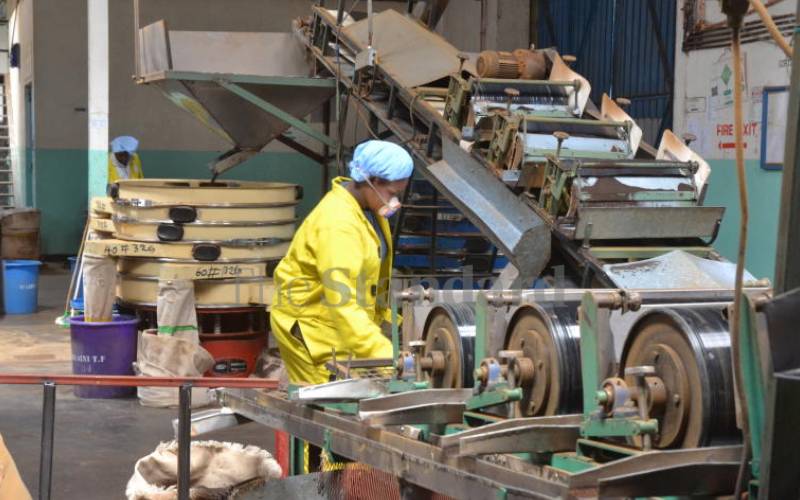
Worker in operation at Iria-ini tea factory. [John Gathua, Standard]
While the backbone of Kenya’s economy is agriculture, agro-processing companies can be counted on a single hand, painting a picture of a nation that stops at the primary production level.
Agriculture experts have long held that the lack of commercialisation of the agricultural sector deprives the country of lots of revenue, particularly in the value addition chain.
Their argument is buoyed by recent statistics that show the country has been importing most of its food commodities, pointing to market demand, especially in the value addition chain.
According to the Kenya National Bureau of Statistics 2020 economic survey, the country’s reliance on foreign foodstuff posted a sharp increase.
Kenya’s Import Dependency Ratio (IDR) worsened from 15.4 per cent in 2018 to 16.4 per cent in 2019.
The IDR for vegetable and animal products worsened from 18.9 and 2.9 per cent in 2018 to 19.4 and 4.2 per cent, respectively, in 2019, indicating increased reliance on imports of the given commodities.
High costs involved
Dr Tim Njagi, a development economist and research fellow at Tegemeo Institute of Agricultural Policy and Development, Egerton University, says that the biggest hindrance to venturing in agro-processing industry is lack of capital.
“Starting an industry requires manpower and machines and they are not cheap. If we can address the high cost involved in running an industry then we are on a sure path to success,” says Njagi.
Recognising the high cost of starting and running a manufacturing industry, the state in its 2021-2022 budget resolved to help the sector by advancing finance to SMEs engaged in manufacturing.
In Yatani’s second budget, the state-issued Sh616 million to small and medium businesses involved in the production of goods.
The move by the state to pump in cash to the manufacturing sector is seen as a direct resuscitation of the sector, which was on its knees after the pandemic struck.
The cash is expected to be a huge relief to businesses, which have for decades complained of lack of capital to help them in manufacturing products.
Njagi lauds the initiative but cautions that its needs to be sustained for a while.
“The cash pumped into the manufacturing sector, targeting SMEs, is laudable but the state needs to sustain this for a while for the benefits to be realised, but the issue arises when the funding is done sporadically,” he said.
According to the latest data available from the government parastatal in charge of the SMEs, the bulk 84.4 per cent of SMES are in the service industry, 11.8 per cent are in the manufacturing while 3.3 and 0.5 per cent are involved in agri-business and construction industries respectively.
Small-scale farming is limiting
Other than lack of capital that derails new players to join the agro-processing industry our small scale agricultural practices affects the establishment of manufacturing plants.
Interestingly, although the country is known as an agricultural nation it barely produces to satisfy its population.
According to the 2020 economic survey the agricultural sector performance decelerated from 6.1 per cent recorded in 2018 to 3.6 per cent in 2019.
Maize production declined from 44.6 million bags in 2018 to 39.8 million bags in 2019, cane deliveries to factories declined from 5.3 million tonnes in 2018 to 4.6 million tonnes in 2019.
The only product which posted an increase in production in 2019 was milk with the deliveries made to dairy processors increasing by 5.3 per cent from 634.3 million litres in 2018 to 668.2 million litres in 2019.
This means that Kenya has to source for imports to be able to feed its population comfortably, a situation Njagi says cannot support agro-processors.
“For you to sustainably run a food factory you must ensure you have a consistent supply from farmers, unfortunately, the bulk of our farmers are small-scale not unless you aggregate them into cooperatives you run the risk of your machines going silent,” he said.




No comments :
Post a Comment